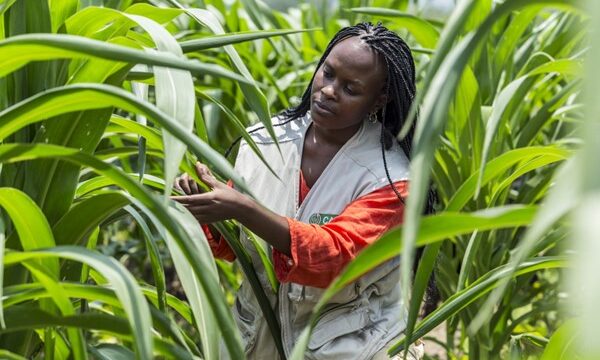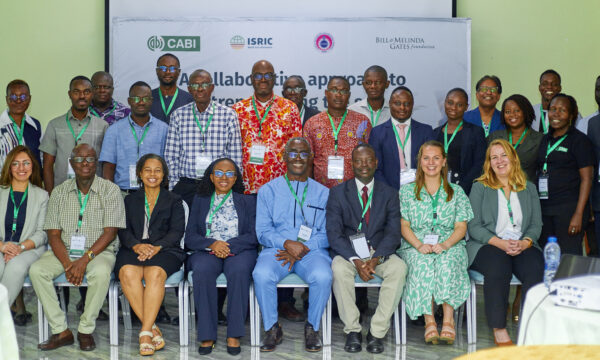
Pesticide risk reduction is a crucial component of sustainable food systems. On World Food Day, we must raise awareness about the need for global collaboration to create sustainable, prosperous, and food-secure futures for all by transforming agrifood systems.
In a warming climate, plant pests and diseases are a growing cause for concern in food production. Invasive species, such as desert locust, can seriously impact crop yields and threaten food security. Smallholder farmers use pesticides to manage these types of pests. However, if not used appropriately, chemical products can harm the health of the farmers who use them and non-target organisms. Ultimately, this reduces productivity and weakens the ecosystems that support sustainable agriculture.
In this blog, we look at the risks that pesticides pose and highlight some of the key CABI initiatives that help overcome these risks. We consider the ways in which they help to build resilient systems for food production.
Why pesticide risk reduction matters for food systems and food security
Pesticide misuse and overuse can cause serious harm to people, animals, and ecosystems. Farmers, in particular, risk severe health impacts from pesticide poisoning, resulting in long-term illness and even death. Smallholder farmers produce most of the world’s food and, as such, must be protected. We must give them access to the information and resources they need to reduce the risks of harmful chemical exposure.
Pesticides can also be damaging to animals and ecosystems. Specifically, they contribute to biodiversity loss. Chemical products can affect non-target species, including vital pollinators, disrupting food production and food security. Moreover, unsafe pesticide residues can affect consumer and market confidence, affecting food chains.
For these reasons, reducing pesticide risk is beneficial. While many farmers rely on chemicals to treat plant pests and diseases and increase crop yields, reducing reliance on chemical products does not mean a reduction in productivity. There is another way: nature- and science-based pest management. When adopted, they can protect yields while reducing harm.
CABI’s work in pesticide risk reduction
CABI and our partners are working hard to help farmers move to more sustainable pest management. These initiatives support the Sustainable Development Goals, specifically SDG 12: Sustainable consumption and production.
Through PlantwisePlus, for example, CABI has developed a pesticide risk reduction pathway. The programme recognizes the urgent need to increase the uptake of lower-risk plant protection products and chemical pesticide alternatives by farmers. The pathway focuses on raising awareness of, access to, and use of affordable integrated pest management (IPM) solutions. Plant clinics and digital tools provide sustainable science-based plant health knowledge in dozens of countries around the globe.
Working closely with governments, CABI also helps to train farmers, extensionists, agro-input dealers, regulators, and service providers in pesticide risk reduction and pesticide alternatives. Agro-dealers, for example, can play a critical role in sharing knowledge about pesticide safety and biopesticides with farmers. The training ties into country certification and promotes bioprotection products as sustainable alternatives to pesticides. CABI is committed to sharing knowledge about pesticide alternatives. Our BioProtection Portal, for example, is the largest free resource for biological plant protection.
In addition, CABI has supported governments, such as Pakistan, with the introduction of a biopesticide regulation. Pakistan has now legalized the registration of biopesticides to sustainably fight crop pests and diseases, which threaten livelihoods and food security.
The connection between pesticide risk reduction and sustainable food systems
These initiatives are helping to create sustainable food systems. Not only do they support the reduction of risks to the health of farmers, consumers, animals, and ecosystems. They embed pesticide risk reduction into existing food systems. For example, by increasing agro-dealer training and certification, farmers’ access to reliable information on pesticide risk reduction is also increased. It is also increasing their access to low-risk pesticide alternatives. Where extension services are limited, trained agro-dealers can become trusted sources of advice. Certified agro-dealers can be embedded within existing local networks and food systems, making them sustainable.
Our initiatives also integrate biopesticides and pesticide alternatives into national policy and regulatory frameworks. This means lower-risk products are promoted and properly regulated from the top down. Their integration facilitates proper adoption and ensures biopesticides are available and used effectively within existing national food systems.
Our work in value chains and trade also helps countries to keep pesticide residues below the maximum residue levels (MRLs). Through this, countries can comply with international regulations and establish or maintain their access to prosperous high-value markets. This adherence helps national food systems to remain competitive and sustainable, boosting the economy.
Strengthening the future of sustainable food security
Pesticide risk reduction is important in its own right. It helps to protect the health and safety of people, animals, and ecosystems. However, it can also reinforce sustainability throughout different parts of national and international food systems, from consumer health to thriving horticultural markets. By reducing our reliance on chemical pesticides, we make food systems more sustainable. In doing so, we protect food security today and for generations to come.
More information
Feature image: Farmer in Ghana (©Evans Ahorsu for CABI).
See more:
● CABI Academy’s course on Reducing Pesticide Risk
● How agro-dealer training in Uganda is reducing pesticide risks and making farming safer
Related News & Blogs
Strengthening the potato value chain in the Kurdistan Region of Iraq
On 30th May, we marked the International Day of Potato. In this blog, CABI’s Crop Health Advisor Anna Wood provides an update on a five-year project led by CABI to strengthen the potato value chain in the Kurdistan Region of Iraq. An ambitious five-yea…
3 June 2025





